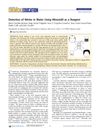 July 2021 in “IntechOpen eBooks”
July 2021 in “IntechOpen eBooks” Ginseng, especially its component ginsenosides, can promote hair growth, reduce hair loss, and potentially treat conditions like alopecia by affecting cell pathways and cytokines.
January 2018 in “Journal of human virology & retrovirology” Lifestyle drugs are mainly used by wealthy people in India but could spread to others, affecting society and youth.
 January 2017 in “Archives of Aesthetic Plastic Surgery”
January 2017 in “Archives of Aesthetic Plastic Surgery” Hair care products with placental growth factor can improve hair thickness and density in postpartum hair loss.
[object Object]  October 2016 in “Iranian journal of psychiatry and behavioral sciences”
October 2016 in “Iranian journal of psychiatry and behavioral sciences” Sertraline, an antidepressant, may cause hair loss in rare cases.
March 2023 in “Anais Brasileiros De Dermatologia” Topical minoxidil is the best-supported treatment for female hair loss, but personalized plans are needed.
January 2023 in “Applied sciences” Equisetum debile extracts may help with skin whitening, anti-wrinkle, and anti-hair loss treatments.
 37 citations,
April 2013 in “Plastic and Reconstructive Surgery”
37 citations,
April 2013 in “Plastic and Reconstructive Surgery” Genetic and environmental factors, like smoking and exercise, affect male hair loss.
 20 citations,
July 2015 in “Journal der Deutschen Dermatologischen Gesellschaft”
20 citations,
July 2015 in “Journal der Deutschen Dermatologischen Gesellschaft” Green tea may help with skin health and protect against UV damage, but more research is needed to confirm its safety and effectiveness.
 2 citations,
January 1908 in “Journal of the American Medical Association”
2 citations,
January 1908 in “Journal of the American Medical Association” Fear of hair-related issues causes significant mental distress, especially in high-stress women.

Modern hair restoration techniques can effectively treat hair loss and provide natural-looking results.
 53 citations,
January 2017 in “Skin appendage disorders”
53 citations,
January 2017 in “Skin appendage disorders” Botulinum toxin shows promise for various skin conditions but requires more research for confirmation and standardized use.
 49 citations,
November 1992 in “Archives of dermatology”
49 citations,
November 1992 in “Archives of dermatology” Different treatments for alopecia areata have varying success rates and side effects; intralesional steroids are most effective.
[object Object]  1 citations,
March 2004 in “Journal of The European Academy of Dermatology and Venereology”
1 citations,
March 2004 in “Journal of The European Academy of Dermatology and Venereology” Hair loss improved with treatment and successful transplant.
 32 citations,
December 2017 in “Journal of Drug Delivery Science and Technology”
32 citations,
December 2017 in “Journal of Drug Delivery Science and Technology” Minoxidil and caffeine in transfersomes improve hair growth treatment.
 7 citations,
July 2018 in “International Journal of Applied Pharmaceutics”
7 citations,
July 2018 in “International Journal of Applied Pharmaceutics” Chitosan nanoparticles are promising for sustained caffeine delivery through the skin.
 3 citations,
January 2018 in “International Journal of Cosmetic Science”
3 citations,
January 2018 in “International Journal of Cosmetic Science” Hair stiffness increased by 13.2% after caffeine treatment, validating the Stiffness-Angle Law as an effective measurement method.
 11 citations,
April 2009 in “Pharmacotherapy”
11 citations,
April 2009 in “Pharmacotherapy” Minoxidil can cause deadly skin reaction; monitor patients closely.
 21 citations,
November 1981 in “Archives of Dermatology”
21 citations,
November 1981 in “Archives of Dermatology” Ashy dermatosis may be linked to atopy and thyroid disease and can be treated with topical steroids.
 5 citations,
September 1989 in “Journal of The American Academy of Dermatology”
5 citations,
September 1989 in “Journal of The American Academy of Dermatology” Talc in street cocaine can cause immune-reactive skin nodules where injected.

Arabica coffee pulp extract may help prevent hair loss and promote hair growth.
 11 citations,
June 2013 in “Journal of Chemical Education”
11 citations,
June 2013 in “Journal of Chemical Education” Minoxidil detects nitrite in water, creating a simple, cheap test.
 42 citations,
September 2017 in “Advances in protein chemistry and structural biology”
42 citations,
September 2017 in “Advances in protein chemistry and structural biology” Surface Plasmon Resonance is a useful tool for studying protein interactions and has potential for future technological advancements.
 August 2021 in “Journal of Fundamental and Applied Pharmaceutical Science”
August 2021 in “Journal of Fundamental and Applied Pharmaceutical Science” Black tea extract at 5% concentration promotes the most hair growth.
 466 citations,
August 2004 in “Journal of the American Academy of Dermatology”
466 citations,
August 2004 in “Journal of the American Academy of Dermatology” Rosacea is a skin condition with unclear causes, classified into four subtypes.
 434 citations,
October 2003 in “PTR. Phytotherapy research/Phytotherapy research”
434 citations,
October 2003 in “PTR. Phytotherapy research/Phytotherapy research” Natural products in cosmetics are beneficial for skin and hair care with low toxicity.
 282 citations,
April 2007 in “Journal of Agricultural and Food Chemistry”
282 citations,
April 2007 in “Journal of Agricultural and Food Chemistry” Apple polyphenol, especially oligomeric procyanidins, can reduce fat absorption and lower blood fat levels.
 244 citations,
September 2008 in “Annual Review of Genomics and Human Genetics”
244 citations,
September 2008 in “Annual Review of Genomics and Human Genetics” The document concludes that the fast-growing direct-to-consumer genetic testing market lacks sufficient regulation, posing risks to consumers due to questionable test quality and accuracy.
 64 citations,
May 2019 in “Materials Science and Engineering: C”
64 citations,
May 2019 in “Materials Science and Engineering: C” Microneedle technology has improved drug delivery and patient comfort but needs more research for broader use.
 54 citations,
November 1998 in “Archives of dermatology”
54 citations,
November 1998 in “Archives of dermatology” Avoiding certain nutrients and drugs may help manage pemphigus.
 44 citations,
August 2017 in “Food Bioscience”
44 citations,
August 2017 in “Food Bioscience” Researchers made a special butter with added betasitosterol that could be healthier for the heart and stayed good for three months.



























